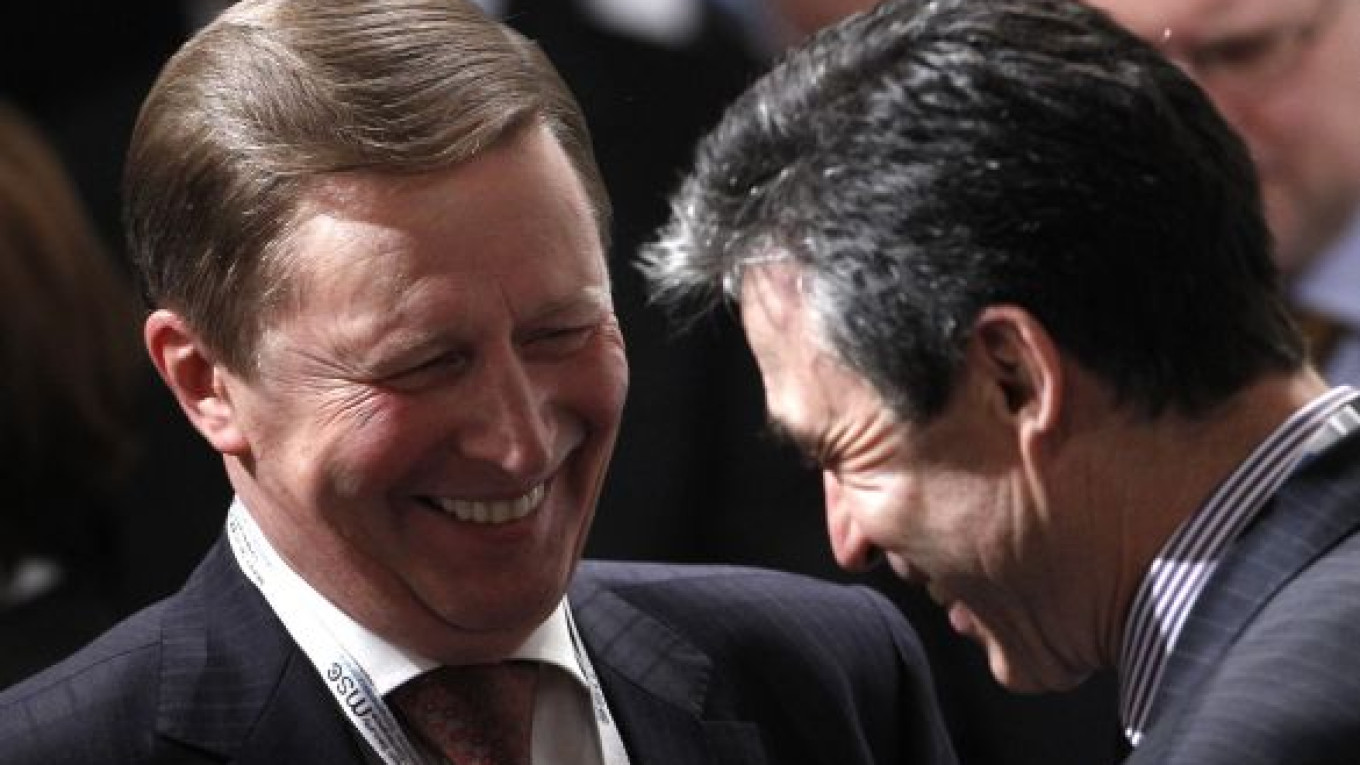MUNICH, Germany — NATO said Saturday that a new Russian military doctrine identifying the security bloc's expansion as a threat did not reflect the real world and undermined efforts to improve ties between the Western military alliance and Moscow.
President Dmitry Medvedev approved his country's new military doctrine Friday.
The doctrine identifies one of the "main external threats of war" as NATO's expansion east to Russia's borders, and it sees U.S. plans to create an anti-missile shield in Europe as a concern for national security. It also reaffirms Russia's right to use nuclear weapons if the country's existence is threatened.
But the new guidelines do not follow through on the idea floated last year by the chief of the Security Council, Nikolai Patrushev, of allowing the use of nuclear weapons in regional conflicts.
"I have to say that this new doctrine does not reflect the real world. … NATO is not an enemy of Russia," NATO Secretary-General Anders Fogh Rasmussen said in an interview on the sidelines of a security conference in Munich.
"It does not reflect realities, and it is in clear contradiction with all our endeavors to improve the relationship between NATO and Russia."
Rasmussen said NATO was keen to develop a strategic partnership with Russia and to expand cooperation in Afghanistan, where the two sides share security concerns.
He said he would stress these issues in a meeting in Munich with Foreign Minister Sergei Lavrov.
"I have urged Russia to step up their engagement in Afghanistan. I have presented proposals to the Russians when I visited Moscow in December as to how they could further their engagement," Rasmussen said. "I think Russia and we share the same interests in success in Afghanistan."
But analysts said the Russian move was another setback for Rasmussen's priority of improving ties with Moscow, having inherited an extremely strained relationship from predecessor Jaap de Hoop Scheffer last year.
NATO froze ties with Moscow over Russia's 2008 intervention in Georgia and has only gradually resumed formal contacts.
Thomas Valasek, of the Centre for European Reform think tank, said NATO would continue to try to forge greater cooperation on shared security concerns, even though progress had been limited.
He said Russia had been consistent in its view of NATO as a threat and in looking for ways to divide the alliance and halt its enlargement, while NATO was "torn between seeing Russia as it is and seeing it as we would like it to be."
Russia has agreed to allow land transit of nonlethal NATO supplies to Afghanistan and pledged to do all it can to help the alliance's troubled Afghan effort, short of sending troops, but Valasek said there had been little significant cooperation.
"Even the vaunted northern corridor [supply route], hasn't really gone anywhere," Valasek said. "There's been one shipment that's come through, that's all. The reason is that the Russians are insisting on substantial payments for the service. NATO thought it was in a partnership, they view it as a business."
A Message from The Moscow Times:
Dear readers,
We are facing unprecedented challenges. Russia's Prosecutor General's Office has designated The Moscow Times as an "undesirable" organization, criminalizing our work and putting our staff at risk of prosecution. This follows our earlier unjust labeling as a "foreign agent."
These actions are direct attempts to silence independent journalism in Russia. The authorities claim our work "discredits the decisions of the Russian leadership." We see things differently: we strive to provide accurate, unbiased reporting on Russia.
We, the journalists of The Moscow Times, refuse to be silenced. But to continue our work, we need your help.
Your support, no matter how small, makes a world of difference. If you can, please support us monthly starting from just $2. It's quick to set up, and every contribution makes a significant impact.
By supporting The Moscow Times, you're defending open, independent journalism in the face of repression. Thank you for standing with us.
Remind me later.


